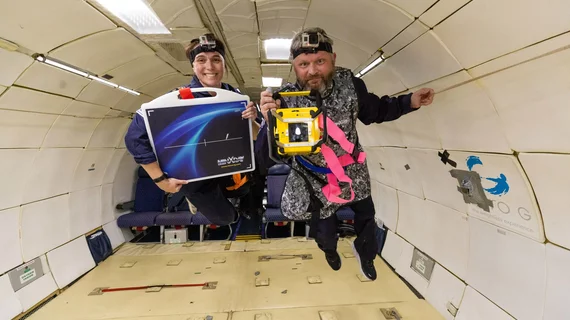Imaging industry names in the news: Blackford, Carestream, Fujifilm, Siemens, 8 more
Dallas-based MedCognetics and its academic R&D partners will have $750,000 more to spend refining diversity-calibrated AI for early detection of breast cancer. The windfall comes courtesy of the NIH’s “AIM-AHEAD” initiative. (That’s an acronym for Artificial Intelligence/Machine Learning Consortium to Advance Health Equity and Researcher Diversity.)
The announcement, posted Jan. 26, follows a few weeks on the heels of the FDA’s approval of MedCognetics’s QmTriage product, developed with UT Southwestern Medical Center to overcome the lack of ethnically diverse populations available for AI model training.
The AIM-AHEAD grant is a subaward shared by the University of North Texas Health Science Center in Fort Worth.
“We selected MedCognetics as one of our grant recipients because of its focus on developing technology aimed at addressing the data bias of historically ignored populations, especially regarding breast health and imaging,” says UNT professor and AIM-AHEAD research coordinator Jamboor Vishwanatha, PhD. “We are encouraged by the company’s initial success and look forward to collaborating toward the mutual goal of improved healthcare, prevention, diagnoses and overall better outcomes.”
In other imaging industry news:
Fujifilm Healthcare Americas (Lexington, Mass.) has grown its enterprise imaging footprint with the purchase of Inspirata’s digital pathology business (Jan. 25). In announcing the move, Fujifilm said it’s adding a pathology division to its medical informatics operation. Mark Lloyd, PhD, joins from Inspirata to lead the division. Fujifilm says its entry into pathology will expand the company’s Synapse enterprise imaging product line.
Tallying new patents it was awarded in 2022, Carestream Health (Rochester, N.Y.) has counted 20 (Jan. 24), including 15 in the U.S. The patents include advances in AI, image quality, DR detectors and mobile imaging applications. Carestream CTO Dharmendu Damany: “These patents are the result of our continuous investment in global research and development … to advance solutions that clearly work in every aspect of medical imaging, from image capture through diagnosis.”
Imaging equipment sales and services company Radon Medical Imaging of Charleston, W.Va., has acquired similarly structured Premier Imaging Medical Systems of Rome, Ga. (Jan. 24). “We’ve been partnering with Premier for more than 20 years and are thrilled to formalize our relationship and officially welcome them to the Radon family,” says Radon CEO Anthony Border. Robin West, now-former owner of Premier, adds: “[W]e believe the cultural alignment of both firms will provide all our people with the opportunity to do great things together and lead to greater success for everyone.”
Siemens Healthineers saw its Somatom Emotion 6 CT scanner uncover secrets about 2,300-year-old “Golden Boy” mummy in Egypt (Jan. 24). Among the surprising findings were 49 amulets of precious materials buried with the then-teenager, suggesting wealth and high social status. Along with a peer-reviewed research article in Frontiers in Medicine, coverage was copious in the consumer press.
Cubresa (Winnipeg, Man.) has installed its investigational brain PET insert system, which enables combined PET/MR imaging, at Massachusetts General Hospital’s Martinos Center for Biomedical Imaging (Jan. 23). The system will support research into basic neuroscience as well as such varied conditions as autism, depression, schizophrenia and substance addiction. “Simultaneous acquisition of MR and PET images can provide unparalleled insights into the brain,” says Harvard radiologist Ciprian Catana, MD, PhD. “We expect this unique MR-compatible head-only PET insert to advance a range of ongoing studies of neurological disorders.”
Autonomous AI medical imaging company Oxipit of Vilnius, Lithuania, has closed a funding round worth close to $5 million to grow its business (Jan. 19). The company’s present product line includes ChestLink, which Oxipit says can produce radiology reports without a radiologist. The managing partner of one of three firms leading the round says Oxipit’s innovations “could revolutionize medical image processing and greatly improve diagnostic efficiency and quality.”
Following its takeover by Germany-based Bayer, Blackford Analysis will stay in Edinburgh, Scotland (Jan. 18). Investing executive Niki McKenzie tells The Scotsman newspaper Blackford’s acquisition by a company of Bayer’s global stature “demonstrates the opportunity for the Scottish tech community and the esteem in which it is held internationally.” A few days later, Blackford announced a partnership with Brainomix of Oxford, U.K., to broaden the international market reach of the latter’s stroke care product, e-Stroke.
MinXray (Northbrook, Ill.) has demonstrated the use of its portable X-ray gear in zero-gravity conditions, acquiring diagnostic-quality images during a flight supplied by Zero Gravity Corp. in a modified Boeing 727 (Jan. 17). MinXray collaborated with Diagnostic Ultra-portable X-ray for Space (DUXS) program, a partnership between industry and academia working on space-ready medical imaging capabilities. “X-ray imaging provides additional diagnostic capabilities apart from ultrasound, which is currently used on NASA flights,” MinXray says. “Rapid diagnosis of numerous medical conditions and acute trauma such as fractures, dislocations, respiratory issues or obstructions is now achievable in a zero-gravity or low earth orbit environment.”
Novarad of Salt Lake City is offering developing countries free use of a web-based version of its CryptoChart medical image and report sharing (Jan. 17). The company says the version lets patients as well as providers access records from various digital devices. Novarad says the web version, CryptoChart Lite, is already free for hospitals, imaging centers and clinics in the U.S. and Canada, “although the full version is more conducive to streamlined workflows.”

